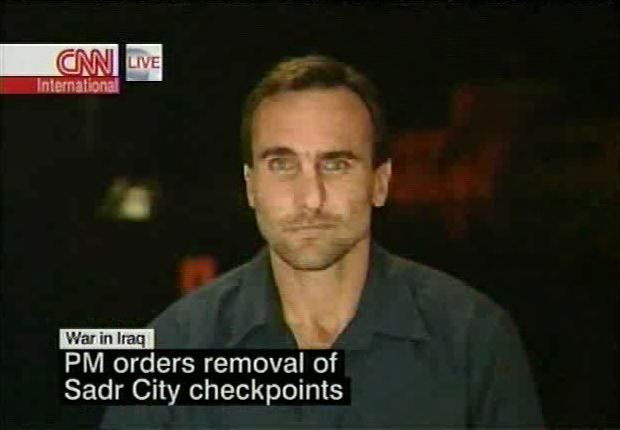YWT: Sadr City showdown

Click photo to play
Length: 4:28
HALA GORANI: All right, now to Iraq, where the prime minister is making clear who has the final say in that country. In a major security crackdown in Sadr City, Nouri al-Maliki ordered the U.S. military to lift checkpoints around the Baghdad district, a stronghold of Shia militia leader Muqtada al-Sadr.
Troops began abandoning their posts shortly after al-Sadr had called for shops to close and people to stay home to protest what he called a siege of Sadr City. U.S. troops set up the cordons last week to search for an abducted soldier. An al-Sadr aide says that was just a ruse.
(BEGIN VIDEO CLIP)
FATAH AL-SHEIK, SPOKESMAN FOR MUQTADA AL-SADR (through translator): What Sadr City went through is another lie similar to what the American government did when it said that there were weapons of mass destruction and occupied Iraq. This time it has another excuse, the abducted soldier, abducted American in Sadr City.
This is not true. There is no abducted American soldier. But this is just an attempt to hit the city or infiltrate it.
(END VIDEO CLIP)
GORANI: Well, the controversy over checkpoints is just the latest public rift between the U.S. and Prime Minister Maliki.
Let's get some perspective now from Michael Ware in Baghdad.
Now, we hear the Iraqi prime minister say to the U.S., dismantle those checkpoints. The U.S. dismantles the checkpoints.
What message is he sending? Is this Maliki trying to assert his authority?
MICHAEL WARE, CNN CORRESPONDENT: Very much so, Hala. In fact, he's playing rather importantly to a domestic audience.
I mean, he needs to establish his own power base separate from the Americans, because quite frankly, he does not have one. I mean, this unfolding story, Hala, is an extremely telling one about the nature of the bilateral relations between the U.S. and Iraq.
It began eight days ago with the mysterious disappearance of a U.S. soldier in the most bizarre circumstances that's left a lot of questions unanswered. However, the American focus in terms of getting this soldier back has been on the Jaish al Mahdi militia of Muqtada al-Sadr and their Sadr City stronghold here in Baghdad.
We saw the city encircled by U.S. and Iraqi checkpoints, driven by the American forces. And then we've seen some targeted raids which have caused an absolute furor.
Now, this came to a head last night when Muqtada himself called for a general strike in Sadr City's population of 2.5 million, which today saw the streets all but empty -- government offices closed, shops closed. This then saw the Iraqi prime minister, America's partner in this all-important hunt for a missing American soldier on the eve of the elections, order the removal of these checkpoints. Not by telling the American forces, but through a release to the media.
It caught the 4th Infantry Division's spokesman off guard, and he had to catch up. We now see those checkpoints being opened -- Hala.
GORANI: All right. One quick question there on the shocking levels of violence we continue to see in Baghdad and across Iraq, mass kidnappings, attacks on wedding ceremonies. Is there any sense that all the talk of increased cooperation between U.S. and Iraqi officials is going to work in reducing the violence?
WARE: Oh, look, there's absolutely nothing to suggest so far that in all of this hot air and rhetoric -- and quite frankly, that's what it's been so far -- that there's anything truly substantive. Certainly not yet on the streets.
I mean, look at this attack in Sadr City. A bomb in a car detonates, killing 15 people in a wedding party convoy. This is in an area just near the Sadr City stronghold of the Jaish al Mahdi militia and was a focus area of the grand American-led Operation Together Forward, the so-called Battle of Baghdad. Yet, we are still seeing a car bomb ripping people apart.
Twenty-two people died in the capital today alone. Ten bullet-riddled bodies, some with signs of execution, were found this morning.
Nothing is being done to really address the core issues, which is the power block -- the building blocks of power here, Hala, the militias, the insurgency and the external players who are having a hand here. Everything is on the surface. Nothing is really being done by the U.S. to affect real change.
GORANI: All right. Michael Ware live in Baghdad.
Thanks so much, Michael -- Jim.
